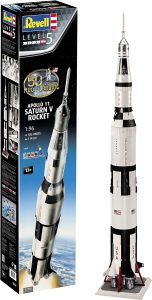Imagine soaring to new heights with your model rockets, effortlessly piercing the sky with precision and power. Welcome to the world of altimeter-empowered model rocketry, where cutting-edge technology meets thrilling adventure. Whether you're a seasoned enthusiast or just starting out, this comprehensive guide will walk you through the ins and outs of altimeters for model rockets, helping you unlock the full potential of your aerial creations.
Quick Links to Useful Sections
What Is an Altimeter for Model Rockets?
An altimeter is a crucial component in model rocketry, serving as a precision instrument that measures the altitude of your rocket during flight. This tiny but powerful device helps you track the rocket's ascent, peak altitude, and descent, providing invaluable data for optimizing performance, ensuring safety, and pushing the boundaries of what's possible.
By integrating an altimeter into your model rocket, you'll gain a deeper understanding of its flight dynamics, enabling you to fine-tune your designs, experiment with new configurations, and take your rocketry skills to the next level.
How Do Altimeters for Model Rockets Work?
Altimeters for model rockets typically employ one of two primary methods to measure altitude: barometric pressure sensing or GPS (Global Positioning System) technology.
- Barometric Pressure Sensing: These altimeters use a tiny pressure sensor to detect changes in atmospheric pressure, which correspond to changes in altitude. This method is simple, reliable, and cost-effective, making it a popular choice for model rocket enthusiasts.
- GPS Technology: GPS-based altimeters utilize satellite signals to determine the rocket's precise location and altitude. This method offers higher accuracy and can provide additional data, such as velocity and acceleration, but may be more complex and expensive.
Both methods have their advantages and limitations, and the choice between them depends on your specific needs, budget, and preferences.
Looking For The Best Model Rocket Kits? You'll Love These:
Key Features to Consider When Choosing an Altimeter for Model Rockets
When selecting an altimeter for your model rocket, consider the following essential features to ensure you get the right tool for your needs:
- Accuracy: Look for altimeters with high accuracy ratings, typically measured in feet or meters, to ensure reliable data.
- Resolution: A higher resolution means more precise data, but may also increase the cost and complexity of the altimeter.
- Sampling Rate: A faster sampling rate provides more detailed data, but may also increase the amount of data to be processed and stored.
- Data Storage: Consider altimeters with onboard data storage or wireless data transmission capabilities to easily access and analyze your data.
- Power Consumption: Choose an altimeter with low power consumption to minimize battery drain and maximize flight time.
- Size and Weight: Select an altimeter that is compact and lightweight to minimize its impact on your rocket's overall performance.
By carefully evaluating these features, you'll find the perfect altimeter to meet your model rocketry needs and take your flights to new heights.
Popular Altimeter Options for Model Rockets
Here are some popular altimeter options for model rockets, each with their unique features, advantages, and price points:
- Apogee Altimeter: A popular, affordable option with high accuracy and a simple, user-friendly interface.
- PerfectFlite Altimeter: A high-end option with advanced features, such as GPS and acceleration data, ideal for experienced enthusiasts.
- Eggfinder Altimeter: A compact, lightweight option with wireless data transmission and a user-friendly app for data analysis.
Research and compare these options to find the best fit for your model rocketry needs and budget.
Resources and community Support: Your Next Steps
To get the most out of your altimeter and model rocketry experience, explore the following resources and communities:
- Online Forums: Join online forums, such as Reddit's r/modelrockets, to connect with fellow enthusiasts, share knowledge, and learn from their experiences.
- Manufacturer Support: Take advantage of manufacturer-provided resources, such as tutorials, documentation, and customer support, to get the most out of your altimeter.
- Local Model Rocketry Clubs: Join local clubs or attend model rocketry events to network with other enthusiasts, learn from their experiences, and gain hands-on knowledge.
By tapping into these resources and communities, you'll stay up-to-date with the latest developments, learn new techniques, and optimize your model rocketry experience.
Frequently Asked Questions: Altimeters for Model Rockets
Here are some frequently asked questions about altimeters for model rockets:
1. What is the purpose of an altimeter in model rocketry?
An altimeter measures the altitude of a model rocket during flight, providing valuable data for optimizing performance, ensuring safety, and pushing the boundaries of what's possible.
2. How accurate are altimeters for model rockets?
Altimeters for model rockets can be highly accurate, with some models offering accuracy ratings of ±10 feet or better.
3. What types of altimeters are available for model rockets?
There are two primary types of altimeters: barometric pressure sensing and GPS-based. Each has its advantages and limitations, and the choice between them depends on your specific needs and preferences.
4. How do I choose the right altimeter for my model rocket?
Consider factors such as accuracy, resolution, sampling rate, data storage, power consumption, and size when selecting an altimeter for your model rocket.
5. Can I build my own altimeter for model rockets?
Yes, you can build your own altimeter using various components and programming languages. However, this approach may require significant expertise and time.
Looking For The Best Model Rocket Kits? You'll Love These:
Useful Interruption: Dive deeper into the world of Model Rockets with our most popular sections. If there is anything you think is missing or anything you would love for us to write about, just give us a shout.
- Getting Started & Basics With Model Rockets
- Model Rocket Design, Build & Customization
- Model Rocket Propulsion & Engine Technology
- Model Rocket Launch Techniques & Recovery
- Model Rocket Advanced Rocketry & Innovations
- Model Rocket DIY and Customization
- Model Rocket Equipment Reviews & Digital Tools
- Community, Competitions & Education
- Model Rocket Troubleshooting & FAQs
- Model Rocket Bonus/Seasonal & Niche Topics
A group of model rocket enthusiasts gathered at a field for their weekly launch event. Among them was Dave, a seasoned builder known for pushing the limits of hobby rocketry. This time, he had outdone himself.
“Ladies and gentlemen,” Dave announced, dramatically pulling a cloth off his latest creation, “I present to you: The Kraken!”
The crowd gasped. This wasn’t just a model rocket, it was a monster. The thing stood 8 feet tall, had six clustered engines, and was covered in enough duct tape to qualify as a classified aerospace project.
“Dave,” muttered Steve, the cautious safety officer, “Have you, uh… done the math on this?”
“Math?” Dave scoffed. “I built it in my garage at 3 a.m. with parts from eBay. This is an art piece, Steve.”
The countdown began.
5…
4…
3…
2…
1…
The engines ignited with a BOOM, and The Kraken shot up… kind of. It immediately did a violent barrel roll, narrowly missing the spectators before skyrocketing at an angle that could only be described as “legally questionable.”
The crowd collectively ducked as The Kraken flew straight over the adjacent cornfield, where Old Man Jenkins, the grumpiest farmer in town, was minding his business.
KABOOM!
The rocket disappeared behind the barn. A moment later, a flaming piece of Estes igniter wire landed at Steve’s feet. The silence was deafening.
And then, an unmistakable sound echoed across the field.
Jenkins’ shotgun being cocked.
“DAVE!!!” Steve shouted. “RUN.”
And that was the day Dave invented the first-ever biologically powered rocket booster: pure adrenaline.
To this day, nobody knows where The Kraken landed, but legend has it, it still haunts the skies, terrifying unsuspecting drones and low-flying birds.















